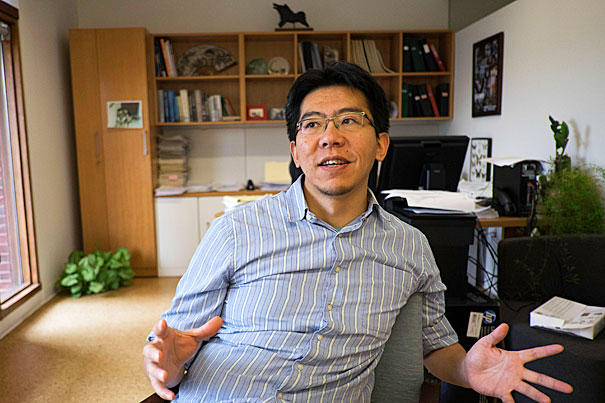 Harvard Stem Cell Institute (HSCI) researchers, representing five Harvard departments and affiliated institutions as well as the Massachusetts Institute of Technology (MIT), have demonstrated that adult cells, reprogrammed into another cell type in a living animal, can remain functional over a long period.
Harvard Stem Cell Institute (HSCI) researchers, representing five Harvard departments and affiliated institutions as well as the Massachusetts Institute of Technology (MIT), have demonstrated that adult cells, reprogrammed into another cell type in a living animal, can remain functional over a long period.The work by Joe Zhou, an associate professor in Harvard’s Department of Stem Cell and Regenerative Biology, and his collaborators is an important advance in the effort to develop cell-based therapies for tissue repair, and specifically in the effort to develop improved treatment for diabetes.
The researchers used a combination of genes to change pancreatic exocrine cells — one of the main forms of cells in the pancreas — in adult mice that have diabetes into insulin-producing beta cells that appeared to cure about a third of the mice of the metabolic disease, and improved insulin production in most of the other mice.
A report on the work was published today in the journal Nature Biotechnology.
The new findings are a major advance in work by HSCI co-director Doug Melton and Zhou, who in 2008 reported having converted exocrine cells into functional beta cells in mice. At that time, however, it was not known how long, and how well, the repurposed cells would function.
“The efficiency of reprogramming has always been an issue,” Zhou said. “Until now, the new cells have either dropped dramatically in number or disappeared completely,” he said, noting that since his work with Melton in 2008 there have been reports published in other programing systems that question whether the reprogrammed cells could be stable enough ultimately to be useful.
“What we have demonstrated is that yes, the reprogrammed cells can be useful, and for that to happen you have to create a niche environment in which the cells can survive,” Zhou continued. “We have improved the reprogramming efficiency to a point where one can create a large enough number of the new cells that the new cells create their own niche environment.”
Zhou said that the researchers studied the mice for up to about 13 months, approximately half their normal life span, and found that “the cells are still there, and fairly robust. These are diabetic animals, and we were able to, I wouldn’t use the word ‘cure’ because that’s a very freighted word for me to use, but they became highly glycemic animals — though not every animal became normal. That may be because to completely control the glucose level of the animal, you not only need beta cells, you need about a quarter of a million functional beta cells. If you are short of this number, even if the beta cells are perfectly normal,” they can’t completely control blood sugar levels, Zhou said.
Another of the study’s authors, Gordon Weir, a Harvard Medical School professor at the Harvard-affiliated Joslin Diabetes Center, called the findings “important because they tell us a lot about the machinery required to make one cell type into another. We are at an early stage of the work,” said the HSCI principal faculty member, “but we now have a new approach that might eventually produce insulin-producing beta cells that could replenish the beta cell deficiency of diabetes.”
When discussing the implications of the study for the field of cellular reprogramming, Zhou cautioned that the pancreas has a particularly simple cellular organization and structure, and thus findings in the pancreas might not necessarily apply to other organs.
Diabetes is a metabolic disease that is seen in two basic forms.
Type 1 diabetes is an autoimmune disease affecting about 3 million Americans, in which the patient’s immune system ultimate destroys all the insulin-producing beta cells in the pancreas, and the patient has to inject insulin in order to regulate blood glucose levels.
Type 2 diabetes, which is now at epidemic prevalence rates in the United States and around the world, is usually caused by being overweight, lack of proper exercise, and improper diet, and can make a patient insulin-resistant, so the insulin the body produces is not sufficient to control blood glucose levels.
If the kind of treatment approach suggested by the new study were to succeed in humans — and that is a question to be answered with further animal, and eventually human, studies — it could be useful in treating both forms of diabetes.
One drawback to the current form of the new approach is that the cellular reprogramming is done with genes, and there might ultimately be unwanted effects on the cells. Zhou said the goal would be to replace the genes with chemicals or, perhaps, RNAs.
“I’ve talked to many clinicians about whether our approach could be used in humans,” Zhou said, “and the opinion is divided. Some say this could be developed into a human treatment, and some say it should be improved. But there seems to be general agreement that it could potentially be useful.”
Source: Harvard
Filed Under: Drug Discovery




